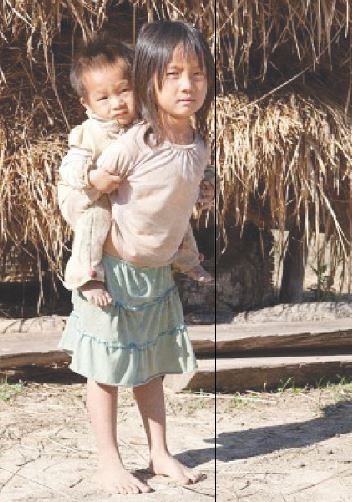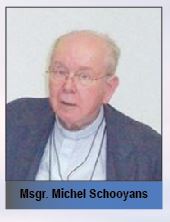 The Church’s social doctrine has become a key defense and foundation of human rights in a world caught between socialism and liberalism, says Monsignor Michel Schooyans. A professor at the University of Leuven in Belgium, Monsignor Schooyans is one of the world’s top experts on ethical and demographic issues.
The Church’s social doctrine has become a key defense and foundation of human rights in a world caught between socialism and liberalism, says Monsignor Michel Schooyans. A professor at the University of Leuven in Belgium, Monsignor Schooyans is one of the world’s top experts on ethical and demographic issues.
He has just published a book in France entitled Pour relever les defies du monde moderne – L’enseignement social de l’Eglise (To Address the Challenges of the Modern World – The Social Teaching of the Church). In this interview with us, Monsignor Schooyans discusses some of the critical issues in his book.
Q: What is the relation between the Church’s social doctrine and the defense of the rights of man?
Monsignor Schooyans: In the first documents in which the social teaching of the Church started to be articulated, the Popes made reference to situations of abuse and oppression which the moral conscience had to denounce.
It was a question of challenging the established structures to transform them into more just economic and political structures. None of this is old – quite the opposite.
However, two new factors have arisen, which have stimulated a more profound study of the Church’s teaching on society.
The first is the experience of totalitarianism, the different manifestations of which have in common that of wanting to destroy the human person psychologically.
The second is the take-off of personalist philosophy, which amply benefited the pastoral constitution Gaudium et Spes of the Second Vatican Council, and which John Paul II began to develop very soon in Krakow and Lublin.
Since then, in its social teaching, the Church emphasizes that human beings are made to live together, that all have received life as something shared with God Himself, of whom all are an image.
In this way, the teaching of the Church sees itself enriched by a rich anthropology that is the foundation of the rights of man: the right to life, to found a family, to practice a religion, to work, to association, etc. Inalienable rights that the state and international organizations must promote and protect.
Q: In your book, you speak of the theology of creation and the theology of work. What is its philosophy? What is its concept of man and of God?
Monsignor Schooyans: The theology of creation finds its foundation in the first chapters of the Book of Genesis. Man is called to transmit life and to be an administrator responsible for creation. However, when man behaves as if he could appropriate the gift of God which is the environment, moral problems arise.
Today there are new forms of avarice that lead some private groups and certain states to abuse the world’s resources, exploiting them according to their particular interests.
What is forgotten is that the goods of the earth have been put by the Creator at the disposition of the whole of humanity. This means that we have a responsibility not only vis-a-vis our contemporaries, but also vis-a-vis future generations.
This explains the Holy Father’s repeated appeals in favor of a human ecology: man is God’s most beautiful gift to man, he writes in synthesis in the encyclical Centesimus Annus. We are not credible when we pretend to respect the environment but do not first respect the human being, and when his role is not recognized as the only one at the summit of creation.
Moreover – and contrary to a bucolic ecology, residue of intellectual dreams of the Enlightenment – when man is absent or does not intervene in nature, the latter becomes violent. Man must constantly cultivate the environment to prevent erosion, desertification, destruction of crops by harmful insects, etc.
Finally, unlike what the pantheistic ecology inspired in the New Age says, man is not the simple product of a material evolution. He must not alienate himself, or be alienated, offering a neo-pagan cult to Mother Earth.
Q: In a chapter of your book, you address the relation between demographic policies and democracy. In another chapter, you show that children are the best investment. What are your arguments?
 Monsignor Schooyans: The Western democracies continue to use and divulge for their advantage the Malthusian ideology and its neo-Malthusian corollaries.
Monsignor Schooyans: The Western democracies continue to use and divulge for their advantage the Malthusian ideology and its neo-Malthusian corollaries.
According to the modern expressions of this ideology, the security of the rich countries would be threatened by the growth of the population of Third World countries. A demographic “bomb” originating in the Third World is supposedly at the point of exploding, submerging the rich countries and threatening their well-being.
Therefore, according to this ideology of demographic security, it is urgent that rich countries control efficiently the growth of the poor populations. This control should be made with the complicity of the ruling classes of the developing countries themselves.
However, such a control ends by being coercive, as demonstrated by the examples of India, Brazil, Mexico, Peru, etc. It is a lie, and a physical and above all psychological aggression, to tell these countries that the development of democracy passes through the mutilation of 40% of women of childbearing age.
The European countries, which have amply financed these campaigns, have been caught in their own trap. By financing and legalizing in their own house the rejection of life, the populations of these countries are aging and also decreasing. It is what the great French demographer Gerard Francois Dumont called the “demographic winter.”
In its social doctrine, the Church confirms, for moral and religious reasons, what many experts in economics, demography and political science say; that is, that what is most important today is not physical capital but human capital, that is, the morally and intellectually well-formed man.
Q: You relate peace and development and propose a world consensus in favor of development. How does the social doctrine of the Church indicate the virtuous path that leads to economic, spiritual and social development?
Monsignor Schooyans: From its beginnings in the 19th century, the social doctrine of the Church has articulated fundamental criticisms against socialism and liberalism.
It reproaches socialism for not trusting the human person and for expecting too much from the public powers.
It recriminates liberalism for favoring an individualism that gives supremacy to the strongest in detriment to the weakest, and for not wanting to recognize the necessary and legitimate role of public powers.
In its social teaching, the Church recognizes the subsidiary role of the public powers: The latter must be at the service of persons, intermediary institutions and civil society; they must be under the latter’s control.
There is a precarious balance that is only kept when the social actors have a strong moral and religious motivation capable of leading them to promote the common good, to have a special tenderness for the most vulnerable, and to work for justice and peace.
This ideal, the only one worthy of man, implies that public powers themselves, international organizations, and economic structures not be indifferent to the truth, that they not be morally relativist, or purely utilitarian or even cynical, but that they all be concerned to serve and not to be served.
In a society that is being globalized, the social teaching of the Church appears as a light that radiates hope.
Reprinted with permission from www.zenit.com